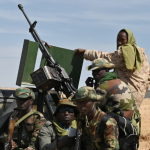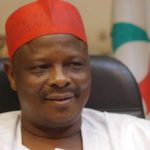Ahead of Nigeria’s 2027 general elections, Kenneth Okonkwo, a key figure in the African Democratic Congress (ADC) and former spokesperson for Peter Obi’s 2023 presidential campaign, has publicly dismissed the idea of backing another southern candidate — including Obi — to challenge President Bola Tinubu.
Instead, he is throwing his weight behind the possibility of a northern contender with national appeal and establishment backing.
Speaking during an appearance on Channels Television’s Politics Today on Tuesday, Okonkwo made it clear that supporting a candidate from the Southeast — Obi’s region — would be politically futile under current circumstances.
“If you bring somebody from the Southeast, even if he wins, they will steal it from him,” he said, pointing to what he described as systemic suppression and the refusal of the political establishment to allow power to shift to the region.
Despite Obi’s third-place finish in the 2023 elections with over six million votes, Okonkwo believes the Labour Party candidate stood little chance without institutional support. “Peter Obi won the election in 2023, and they stole it from us,” he insisted, reiterating a view still held by many of Obi’s followers, though officially denied by the Independent National Electoral Commission (INEC).
Okonkwo, who parted ways with the Labour Party in July 2024 after internal disagreements, now champions a shift in focus toward the North. “My strategy this time around is that I am going to support a northerner in 2027,” he stated. “If the whole north is willing to support Atiku, why not? Or Tambuwal? Or El-Rufai?”
His argument is rooted in political pragmatism. According to Nigeria’s unwritten zoning arrangement, power rotates between the North and South every eight years. With Tinubu, a Southerner, currently serving his first term, many expected the South to complete another four years. But Okonkwo sees things differently.
“Anybody telling you to bring a fresh southerner to compete against Tinubu, a southerner, is trying to tell you to zone the ticket to Tinubu,” he said, warning that such a move would virtually hand the incumbent a second term.
Okonkwo’s remarks come amid renewed opposition efforts to form a united front. On July 2, 2025, top political figures including Atiku Abubakar, Peter Obi, Nasir El-Rufai, Rotimi Amaechi, David Mark, and Rauf Aregbesola adopted the African Democratic Congress (ADC) as a common platform to challenge the All Progressives Congress (APC) in 2027.
Together, Atiku and Obi polled over 12 million votes in 2023, significantly more than Tinubu’s 8.7 million. But Okonkwo suggests that votes alone are not enough without elite and institutional support — especially when facing a sitting president.
“Do you know the South-West has never contested an election against an incumbent?” he asked. “Because they know that in Nigeria, if you don’t have the establishment supporting you, even if you win, they will steal it from you.”
His remarks have sparked conversations about electoral fairness, the durability of Nigeria’s power rotation system, and the strategic miscalculations that often undermine opposition efforts from the Southeast.
As 2027 approaches, Okonkwo’s pivot away from Obi signals not just a personal political shift but a broader recalibration of opposition strategy — one that may shape the next chapter in Nigeria’s electoral politics.











